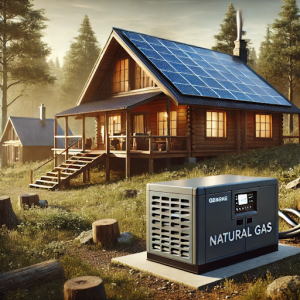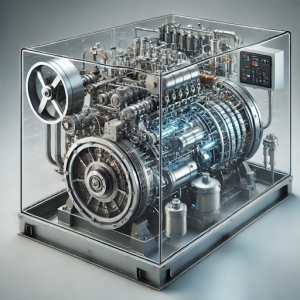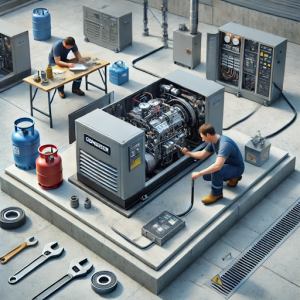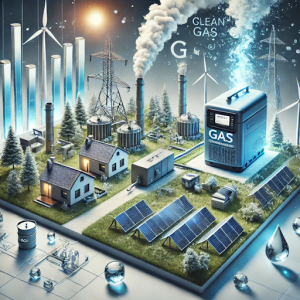Unlock the Power of Natural Gas Generators for Sustainable Off-Grid Living
Natural gas generators represent an exceptional choice for individuals seeking a reliable energy source for their homes or cabins located in remote areas. Understanding the diverse methods of power generation is crucial as you embark on your journey towards off-grid living. The distinctive advantages of natural gas generators, including their impressive reliability, cost-effectiveness, and eco-friendly features, make them a highly attractive option for off-grid living enthusiasts who prioritize sustainability and operational efficiency. Investing in a natural gas generator not only provides peace of mind but also aligns with a commitment to a greener lifestyle.
In an increasingly technological world, the appeal of off-grid living has captivated many. Whether motivated by a passion for sustainability, a quest for independence, or the dream of a self-sufficient lifestyle, disconnecting from the conventional power grid can be profoundly fulfilling. Off-grid power solutions enable you to utilize energy generated from renewable resources or alternative fuels, fostering a comfortable living environment free from the constraints of traditional electricity sources.
Equipping yourself with the appropriate knowledge and preparation will empower you to seamlessly integrate a natural gas generator into your off-grid lifestyle, ensuring that your essential energy needs are consistently met. This article will explore the numerous benefits of natural gas generators, elucidate their operational mechanisms, and outline key considerations for selecting and installing them effectively in your off-grid setup.
 Enhance Your Off-Grid Power Strategy with Essential Insights
Enhance Your Off-Grid Power Strategy with Essential Insights
- Off-grid power solutions liberate you from reliance on traditional energy sources, making them essential for remote living or during unforeseen power outages.
- Natural gas generators provide reliable and efficient energy production, with significantly reduced emissions compared to diesel or gasoline alternatives.
- These generators operate by combusting natural gas to create mechanical energy, which is then transformed into electrical energy through a generator system.
- When choosing a natural gas generator, it is vital to evaluate aspects such as power output, fuel efficiency, and maintenance requirements to ensure optimal effectiveness.
- Proper installation and ongoing maintenance are crucial for the safe and efficient operation of your natural gas generator.
Explore the Exceptional Advantages of Natural Gas Generators for Your Energy Needs
A defining characteristic of natural gas generators is their exceptional reliability. By selecting a natural gas generator to fulfill your off-grid energy requirements, you can depend on a steady power supply tailored to your specific needs. Unlike solar panels or wind turbines, which can be hindered by unpredictable weather conditions, natural gas generators deliver stable energy output, unaffected by external influences or fluctuations.
This reliability is particularly critical for those who depend on electricity for vital functions, including heating, refrigeration, or operating medical equipment. The assurance that your generator will provide power when it’s most needed offers invaluable peace of mind. Additionally, natural gas generators present substantial cost savings, making them an even more appealing choice.
While the initial investment may exceed that of certain alternative off-grid solutions, the long-term savings can be considerable. Natural gas often costs less than gasoline or diesel, leading to lower operational expenses over time. Moreover, the maintenance demands for natural gas generators are generally less onerous than those for other types, allowing you to conserve both time and resources while enjoying a steady and reliable energy source.
 Gain a Clear Understanding of the Operational Mechanics of Natural Gas Generators
Gain a Clear Understanding of the Operational Mechanics of Natural Gas Generators
Natural gas generators operate by converting the chemical energy found in natural gas into electrical energy through a combustion process. When the generator is activated, natural gas mixes with air and ignites within the engine’s combustion chamber. This ignition generates high-pressure gases that drive the engine’s pistons, ultimately rotating the generator’s rotor to produce electricity.
This operational method is particularly significant for its efficiency and cleanliness compared to other fossil fuel options. A crucial component of a natural gas generator is its fuel system, which typically includes a regulator designed to manage gas flow and ensure peak performance. Modern natural gas generators are often equipped with advanced features such as automatic start/stop functions and remote monitoring capabilities.
These technological advancements enhance user convenience, allowing you to better manage your power supply and simplifying your off-grid lifestyle significantly.
Critical Factors to Consider When Selecting a Natural Gas Generator
| Key Consideration | Detailed Description |
|---|---|
| Power Output | Identify the generator’s required power output based on the specific appliances and equipment you plan to operate. |
| Fuel Type | Consider natural gas as your preferred fuel due to its clean-burning and cost-effective nature. |
| Size and Portability | Select a generator size and portability that align with your available space and movement requirements. |
| Noise Level | Assess the generator’s noise output to ensure it meets acceptable standards for your living environment. |
| Start-up Mechanism | Choose between manual or automatic start-up options based on your convenience and frequency of use. |
When selecting a natural gas generator for your off-grid setup, it’s essential to evaluate several key factors thoroughly. Primarily, assess your power requirements by calculating the total wattage necessary to support your essential appliances and devices, ensuring that your chosen generator can effectively handle the load.
It is wise to select a generator with a slightly higher capacity than your calculated needs to accommodate potential spikes in power demand. Additionally, consider the generator’s portability and installation requirements. If you anticipate moving your generator frequently or using it in various locations, look for a lightweight and easily transportable model.
Moreover, think about whether you prefer a stationary installation or a portable unit that can be set up as needed. Lastly, pay close attention to the generator’s noise level; selecting quieter models can greatly enhance your off-grid experience by reducing disturbances and maintaining the serenity of your natural surroundings.
 Essential Best Practices for the Installation and Maintenance of Natural Gas Generators
Essential Best Practices for the Installation and Maintenance of Natural Gas Generators
Installing a natural gas generator necessitates careful planning and execution to ensure both safety and efficiency. Begin by selecting a suitable location for your generator, ensuring compliance with local regulations and safety guidelines. This site should ideally offer good ventilation and be positioned away from flammable materials.
You may also need to create a concrete pad or platform to stabilize and shield the generator from moisture-related damage. Once the optimal location has been determined, connect the generator to your natural gas supply line. If you lack experience with gas line installations, enlisting professional assistance is advisable to ensure all safety standards are met.
After establishing the fuel connection, set up the necessary electrical connections to integrate the generator with your home’s electrical system. Regular maintenance is essential for keeping your generator operating smoothly. This routine includes checking oil levels, replacing air filters, and inspecting spark plugs to maintain optimal performance.
Comprehensive Cost Analysis: Natural Gas Generators vs. Other Off-Grid Power Solutions
When evaluating the costs associated with off-grid energy solutions, conducting a thorough comparison between natural gas generators and other alternatives—such as solar panels and diesel generators—is crucial. Although solar energy systems have gained popularity for their renewable qualities, they often require a significant upfront investment in panels, batteries, and inverters. Additionally, solar systems may struggle to provide adequate power during cloudy weather or at night without sufficient battery storage.
Conversely, diesel generators are known for their reliability; however, they come with higher fuel costs and more frequent maintenance requirements compared to natural gas generators. Given that diesel fuel prices can vary significantly, natural gas often presents a more stable and frequently lower-cost option in many regions. A long-term expense analysis reveals that natural gas generators typically offer a more economical choice for those pursuing off-grid living.
 Evaluating the Environmental Impact of Natural Gas Generators for Off-Grid Living
Evaluating the Environmental Impact of Natural Gas Generators for Off-Grid Living
As you explore energy options for off-grid living, it is vital to assess their environmental impact. Natural gas is often regarded as a cleaner alternative to other fossil fuels like coal or oil due to its lower carbon emissions during combustion. By opting for a natural gas generator, you can significantly lower your carbon footprint while enjoying reliable power for your off-grid lifestyle.
However, it is important to acknowledge that natural gas is still a fossil fuel, and its extraction can pose environmental challenges. Methane leaks that occur during the extraction and transportation processes present considerable concerns regarding greenhouse gas emissions. To mitigate these issues, prioritize sourcing natural gas from reputable suppliers who adhere to sustainable practices.
Moreover, integrating renewable energy sources alongside your natural gas generator can further demonstrate your commitment to environmental sustainability and responsible energy consumption.
Inspiring Case Studies: Real-Life Success Stories of Off-Grid Living with Natural Gas Generators
Exploring real-world examples can provide valuable insights into the effective use of natural gas generators in off-grid living scenarios. For instance, many rural homeowners have successfully transitioned to natural gas generators as their primary energy source following frequent outages from traditional utility services. The implementation of these generators has empowered them to achieve energy independence while ensuring a consistent electricity supply for heating, cooling, and essential appliances.
Another compelling case study includes remote cabins that rely on natural gas generators for seasonal use. Due to their isolated locations, these cabins often lack access to conventional power sources. Natural gas generators enable cabin owners to enjoy modern conveniences such as refrigeration and lighting without compromising their connection to the natural environment.
These success stories illustrate how natural gas generators can effectively support off-grid living, providing both comfort and reliability. As you embark on your journey toward off-grid living, consider the extensive benefits that natural gas generators present. With their reliability, cost-effectiveness, and relatively low environmental impact, these generators are pivotal in achieving energy independence.
By carefully selecting the right model for your needs and adhering to proper installation and maintenance practices, you can transition smoothly into an off-grid lifestyle powered by natural gas.
Answering Your Common Questions About Natural Gas Generators
What features define a natural gas generator suitable for off-grid use?
A natural gas generator designed for off-grid living is a power generation system that utilizes natural gas as its fuel source to produce electricity in remote areas where access to the main power grid is limited or unavailable.
How does a natural gas generator function in off-grid environments?
A natural gas generator intended for off-grid applications operates by combusting natural gas within an internal combustion engine. This combustion generates mechanical energy, which is subsequently converted into electrical energy via a generator. The electricity produced can power various appliances, equipment, and lighting in off-grid settings.
What are the primary benefits of using a natural gas generator for off-grid living?
The key advantages of utilizing a natural gas generator for off-grid living include:
– Reduced fuel costs compared to diesel or gasoline generators
– Cleaner combustion resulting in lower emissions
– Continuous fuel supply sourced from natural gas pipelines
– Lower maintenance needs compared to other fuel types
What factors should be considered when operating a natural gas generator for off-grid living?
Important considerations when using a natural gas generator in off-grid scenarios include:
– Availability of natural gas supply in your region
– Initial installation and equipment costs
– Routine maintenance and servicing needs
– Environmental implications and adherence to emissions regulations
Is a natural gas generator suitable for both residential and commercial off-grid applications?
Natural gas generators designed for off-grid use are applicable for both residential and commercial purposes. They are commonly employed in remote homes, cabins, farms, and small businesses that lack connectivity to the main power grid.
The post Natural Gas Generators for Off-Grid Power Solutions appeared first on Survival Bite.
The Article Natural Gas Generators: Your Off-Grid Power Solution Was Found On https://limitsofstrategy.com
The Article Natural Gas Generators as Your Off-Grid Power Source First Appeared ON
: https://ad4sc.com


Your exploration of natural gas generators as a sustainable energy source for off-grid living resonates deeply with a growing movement towards self-sufficiency and environmental consciousness. There’s something inherently appealing about the notion of disconnecting from the conventional power grid and embracing the autonomy that off-grid living offers. I admire your emphasis on reliability and eco-friendliness, as these are critical factors that many overlook when considering alternative energy solutions.
Your perspective adds a vital layer to this discussion on natural gas generators in the context of off-grid living. The allure of stepping away from the conventional power grid is something I’ve also witnessed firsthand. There’s a certain freedom in it, isn’t there? The ability to generate your own power opens up a world of possibilities. Yet, as I delve deeper into this topic, I can’t help but feel a mix of hope and skepticism.
I appreciate the insights shared in your post about the potential of natural gas generators for off-grid living. It’s fascinating how they balance practicality and sustainability—a harmony that many of us strive for in various aspects of our lives. I can’t help but reflect on how closely aligned our energy choices can be with our values, and the commitment to greener living that you highlight resonates deeply with me.